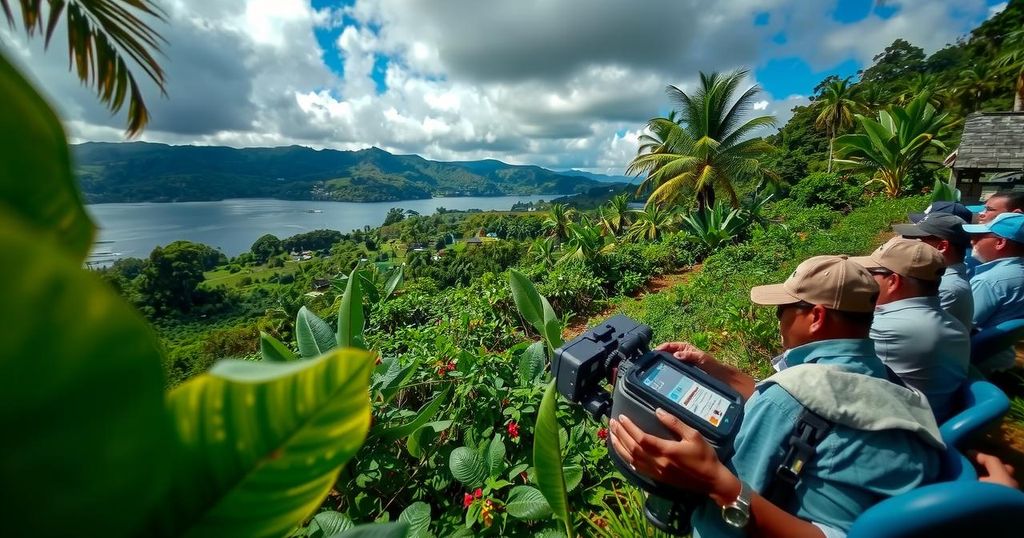Vanuatu’s representative at the ICJ emphasized the historic significance of hearings aimed at establishing a legal framework for addressing climate change. With over 100 countries presenting, there are hopes for far-reaching legal implications for climate justice. However, concerns exist regarding the potential limited impact of the court’s non-binding advisory opinion. The ICJ’s deliberations follow a recent climate deal and highlight urgent international obligations to address greenhouse gas emissions and their consequences for vulnerable nations.
At the International Court of Justice (ICJ) in The Hague, a representative from Vanuatu has claimed that the future of our planet is at stake as the court conducts historic hearings aimed at establishing a legal framework regarding climate change. This landmark case, which has drawn participation from over 100 countries and organizations—marking the highest number of presenters in ICJ history—could significantly influence international and domestic legislation pertaining to climate justice. Ralph Regenvanu, Vanuatu’s climate change representative, emphasized the monumental nature of the case, stating that its outcome will affect not only nations like Vanuatu but humanity as a whole.
Activists hope that the ICJ’s forthcoming opinion will lead to substantial legal ramifications against climate change. Such an opinion could guide ongoing court cases and inspire new legislative efforts worldwide. However, some critics express concerns that the request for a non-binding advisory opinion may yield limited results, and the court’s decision could take months or years to finalize. Demonstrating public interest, activists gathered outside the Peace Palace, brandishing slogans such as, “Biggest problem to the highest court” and calling for immediate climate action funding.
The hearings occur on the heels of a climate deal reached at the COP29 summit, where wealthier nations committed to securing at least $300 billion annually by 2035 for climate aid to developing nations, which many view as insufficient. In 2022, the UN General Assembly referred pivotal questions to the ICJ regarding the obligations of states under international law concerning climate protection and the legal ramifications for states found negligent in their duties.
Legal experts predict that the ICJ’s advisory opinion may not provide definitive solutions but could serve as a crucial legal framework for addressing specifics in climate litigation. The court is expected to ponder over obligations that countries have concerning greenhouse gas emissions, especially pertaining to vulnerable nations, particularly those facing existential threats from climate change-induced phenomena such as rising sea levels. As carbon emissions reach record highs, the urgency of this case amplifies for advocates aiming to enhance climate justice worldwide.
Ultimately, this hearing holds tremendous significance for the movement advocating climate justice, encapsulating the concerns of various nations and youth groups dependent on the court’s ruling for future climate action. The outcome could shape not only environmental policy but also the socio-economic health of nations like Vanuatu and other countries at risk from climate impact.
The International Court of Justice (ICJ) is the principal judicial organ of the United Nations, situated in The Hague, Netherlands. It has the authority to settle legal disputes submitted by nations and to advise UN agencies and the General Assembly on legal questions. Recently, climate change has emerged as a pressing global issue, prompting calls for more robust legal frameworks. Vanuatu, an archipelagic nation in the South Pacific, has been vocal about the adverse impacts of climate change, advocating for international legal recognition to hold countries accountable for their contributions to climate change.
The hearings at the ICJ signal a pivotal moment in the global fight against climate change, marking a collective effort from numerous nations and organizations to pursue legal recognition and action against environmental degradation. With Vanuatu leading the charge for meaningful dialogue and recourse, the potential outcomes of this case could profoundly influence the future of international climate legislation and responsibilities, emphasizing the importance of global cooperation in combating climate change.
Original Source: www.france24.com






